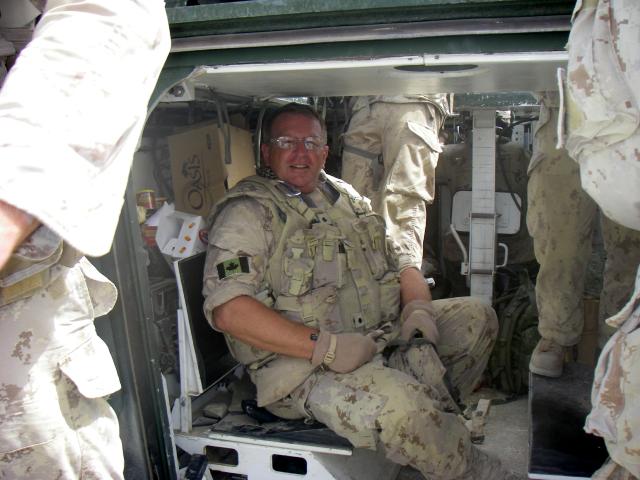The Order of Military Merit caps off 26 years of military chaplaincy for the Rev. Jim Short.

A United Church minister who doesn’t like guns and who describes himself as a pacifist recently received the Order of Military Merit, which recognizes exceptional service or performance of duty. The Rev. Jim Short received the blue-enamelled, straight-end cross from Governor General Julie Payette in November. Reached at his church office at Ladner United in British Columbia, Short said he was totally surprised by the honour, noting that “the Order of Military Merit really is the military version of the Order of Canada.”
“This is not an award that many chaplains get, especially reserve chaplains,” he said. “It was a pretty humbling honour. I always felt I was just doing what I was called to do, but someone above me in the chain of command felt it was more than that, as the motto of the Order is ‘Service Above Self.’”
Short joined the Reserves as a chaplain 26 years ago. In 2008, he accepted a two-year contract with the Regular Force, which included an eight-month tour in Afghanistan. Once there, he led a chaplain team made up of two Catholics and a Baptist chaplain, responsible for the pastoral care of 2,500 people.
Short served as chaplain at a trauma hospital, where he worked with injured soldiers, with 19 dying during his tour. He also spent a lot of time “beyond the wire. As a chaplain, we basically go where soldiers go, in the wilder parts of Afghanistan.”
By travelling with the soldiers on combat missions ̶ and sometimes coming under attack by insurgents ̶ Short said he gained the respect of those around him. “If you aren’t prepared to get dirty and wet with your soldiers, they will never trust you.”
In the field, his main role was to be a source of comfort and spiritual stability to the young men and women in uniform. “Every soldier has children or spouses or families back home, so there is a lot of work for chaplains to do around listening, and helping them deal with what is happening in battle,” he said. “Then there are the moral issues of war, such as what happens with you kill someone, or a buddy of yours is killed in battle.”
As of mid 2017, the United Church had 25 chaplains in the Regular Force, 11 in the Reserve Force, and two in training. However, the work of chaplains has not always been appreciated by the wider church. Short recalls going to a General Council meeting in the early Eighties, where a few military chaplains were seated at the edge of the meeting, excluded from the table groups where discussions are held. “That image is seared in my mind,” he said.
Even in the 1990s, he said some ministerial colleagues would upbraid him if he showed up at a presbytery function in uniform. Thankfully, he said most church members now have a better understanding of a military chaplain’s work. “If we are going to send our young men and women into dangerous situations, we need to send them with the proper mental, physical and spiritual supports,” he said. “War raises a lot of spiritual questions, and triggers lots of spiritual crises.”
While some soldiers suffer emotional damage during their time in the military, Short said many others mature and grow in positive ways while in uniform. “They are much more aware about the world, and of social issues. When they come back, they want to make changes in their community, by becoming police officers, counsellors, or firefighters. They are incredible young people, and it’s been a real honour to be part of that.”
At the ceremony in Ottawa, family members of award recipients were thanked for their support. Short said those words of praise are well deserved. “I could not have done my time in the military without support from my wife, Cathy, and the rest of my family,” he said. “I can’t count how many times in 26 years that our family had something planned, when my Reserves duty took me away from home.”
He also praised the people of Ladner United for granting him time away from the church. “I am their only fulltime employee, so for them to let me go for long periods really says something about what they believe. They always told me: ‘We support what you are doing, so go.’”
When he turned 60 in July, Short was forced to retire from the Reserves. However, he is still involved with soldiers, through the Veterans Transition Network, where he helps veterans readjust to civilian life. “We support on another in whatever that journey back is like,” he said.
He knows that adjustment is not always easy. When he returned to Canada after eight months in Afghanistan, Short said Cathy urged him to go to counselling. “I’m glad I did, for if I hadn’t, I’d be a very different person now,” he said. “If you go to a combat zone, whether as a soldier or a chaplain, you will be affected by it in some way.”
—Paul Russell is Communications Coordinator with the Office of the Moderator and General Secretary.